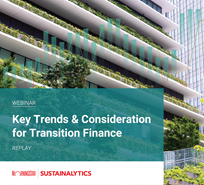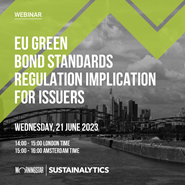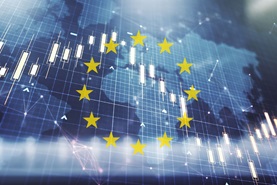Webinar Recap: How Integrating ESG Can Drive Opportunity for Private Companies
Recently, Morningstar Sustainalytics hosted a webinar – ESG in the Lifecycle of a Private Company: How Stakeholder Demands Drive Sustainability in Private Markets – to address some of the questions private companies might have surrounding ESG and how it could impact their business.
What’s Happening in Sustainable Finance: GSSS Market Rebounds, Sovereign Sustainable Debt, and Much More
Get caught up on developments in the global sustainable finance market. This month, we discuss market performance for the first part of the year, continuing scrutiny of SLBs, and the growing group of sovereigns exploring sustainable debt opportunities.
Webinar: EU Green Bond Standards Regulation Implication for Issuers
Sustainalytics invites you to this webinar where we will be discussing the recent regulatory publication on the agreement for the EU Green Bond Standards. We will be highlighting what the implications of these changes are for EU Green Bond Issuers.
Green Bond Principles: What Issuers Need to Know
The green bond market is a portion of the larger debt market that enables and mobilizes funding for projects that contribute to environmental sustainability. Green bonds facilitate capital raising and investments for new and existing projects which have environmental benefits and can mitigate risks associated with climate change.
ESG Spotlight | Supply Chain Incidents: Understanding the Impacts
To help investors understand supply chain controversies, this report explores how supply chain incidents are distributed over time and across industries, markets and event categories. Our analysis aims to enable investors to identify potential areas of portfolio exposure as well as topics for corporate stewardship activities.
Managing Risks for a Changing Climate: A Guide for Institutional Investors
Gain a better understanding of physical and transition climate risks and their potential impacts to effectively respond to climate risks in investment portfolios and comply with the growing list of climate-focused reporting frameworks and regulations.
EU Action Plan Q1 Updates: SFDR Review and Investor’s Challenges
In this webinar, we will take a look at the evolution of sustainable funds in the first quarter of 2023, and review fund flows into Article 8 & 9 funds. We will then explore the latest regulatory updates around the EU Action Plan and the discussions around ESG labelling. Our speakers will discuss the different approaches of disclosures versus labelling and the benefits and shortcomings of each for combatting greenwashing.
Meeting Investor Expectations Through Corporate ESG Reporting, Planning and AGMs
Investors are increasingly influenced by ESG ratings and companies’ approaches to managing ESG risk. While an annual general meeting (AGM) is an ideal opportunity to communicate company plans around managing these risks, ESG reporting goes beyond an AGM or proxy season. Investors want investing to align with values, but are also looking at risk exposure and management.
ESG In Conversation | How Can Investors Address Biodiversity Loss?
In this episode of ESG in Conversation, we’re exploring the question: how can investors address biodiversity loss? Learn about the urgency of addressing biodiversity loss and the role of good stewardship in effecting positive change.
Portfolio Screening as Due Diligence: How Investors Can Implement Responsible Business Conduct
This blog outlines how investors with access to screening options that follow the criteria of the OECD MNE Guidelines and the UNGPs can better assess investee companies’ risk of causing actual and potential adverse impacts. It shows what these research modules can look like and provides some examples outcomes on the effect of applying certain thresholds.
Capturing the Direct and Indirect Risks of Physical Climate Change in Investment Portfolios
Investors face a unique set of challenges in assessing the physical climate risks affecting their portfolio companies. In this blog discover the direct and indirect physical climate risks impacting companies and their supply chains.









.tmb-small.png?Culture=en&sfvrsn=242fe90f_1)









